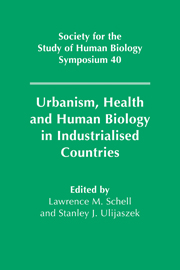Book contents
- Frontmatter
- Contents
- List of contributors
- Part I The urban environment
- Part II Epidemiology
- Part III Poverty and health
- 9 Urban poverty and nutrition in the United Kingdom
- 10 Poverty, nutrition and obesity in the USA
- 11 Nutritional status and its health consequences among low-income urban pregnant women: diet and environmental toxicants
- Part IV Behavior and stress
- Part V The future
- Index
9 - Urban poverty and nutrition in the United Kingdom
Published online by Cambridge University Press: 06 January 2010
- Frontmatter
- Contents
- List of contributors
- Part I The urban environment
- Part II Epidemiology
- Part III Poverty and health
- 9 Urban poverty and nutrition in the United Kingdom
- 10 Poverty, nutrition and obesity in the USA
- 11 Nutritional status and its health consequences among low-income urban pregnant women: diet and environmental toxicants
- Part IV Behavior and stress
- Part V The future
- Index
Summary
Editors' introduction
Urbanisation involves clear changes in patterns of subsistence, such that rural subsistence bases are replaced with social and economic structures that involve the commoditisation of work and subsistence. These structures influence the extent of dietary variation and the level of nutritional adequacy experienced by groups and populations in different urban microenvironments. In this chapter, Dowler examines the ways in which socioeconomic factors impact on urban dietary availability in Britain. While the poorest households in Britain spend the highest proportions of their incomes on food, their intakes of most nutrients are lower than among the better-off in society. Furthermore, the greater the level of poverty, the lower is the overall intake of nutrients, including energy and protein. This is in contrast to the United States, where the poor urban community studied by Johnston and Gordon-Larsen (chapter 10) has high intakes of most nutrients, including energy and protein. Despite superficial environmental similarities, poor populations in London and Philadelphia have quite different nutritional experience. The social geography of London and Philadelphia differ in their national and historical bases and political and economic attitudes to food, contributing to these big differences in seemingly similar contexts.
- Type
- Chapter
- Information
- Urbanism, Health and Human Biology in Industrialised Countries , pp. 175 - 191Publisher: Cambridge University PressPrint publication year: 1999
- 1
- Cited by



